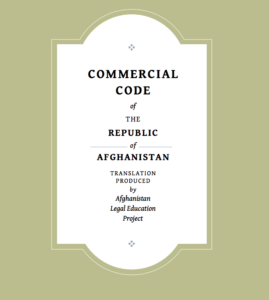ALEP Releases New Translations for Two of Afghanistan’s Most Important Sources of Law
The Afghanistan Legal Education Project (ALEP) publicly released its English translation of the Afghan Commercial Code this week, a follow-up to its translation of the Afghan Civil Code in September 2014.
This represents a significant development for the legal and commercial sectors in Afghanistan, which have been operating without reliable English translations of two of the country’s most important sources of law relating to sales.

ALEP conceived of the translation project when students Sam Jacobson, JD ’14, Chris Jones, JD ’14, Pete DeMarco, JD ’14, Ian Aucoin, JD ’14, Joy Basu, JD ’14, Tarana Riddick, JD ’14, and Arash Aramesh, JD ’14, working under the guidance Erik G. Jensen, Director of the Rule of Law Program, were tasked with writing a textbook on the law of obligations and couldn’t read the contracts material in the Civil or Commercial Codes.
“Given all of the international advice that Afghanistan has received on its legal framework over the last decade, it was particularly surprising to find that some of the most important sources of law in the country were not adequately translated,” Jensen said.
ALEP students worked to mobilize their textbook translation resources to produce a professional-quality translation and, with the help of ALEP Student Director Tres Thompson, JD ’15, ALEP Adviser Rohullah Azizi, and Elite Legal Services, Ltd. saw the project to completion this year.
“ALEP’s work on the translations of the Afghan Civil and Commercial Codes represents our continuing effort to identify and remedy obstacles to legal education and practice in Afghanistan,” said Thompson. “We believe these new translations will be of great help to Afghan students and teachers, as well as legal practitioners, NGOs, and other members of civil society.”
You can download the publication at: here (commercial code) and here (civic code).
About ALEP
Founded in 2007 as a student–driven initiative, the Afghanistan Legal Education Project at Stanford Law School (ALEP) develops innovative legal curricula to help Afghanistan’s universities train the next generation of lawyers and leaders. ALEP has developed an extensive law curriculum at the American University of Afghanistan (AUAF) with strong support from the U.S. Department of State’s Bureau of International Narcotics and Law Enforcement.
